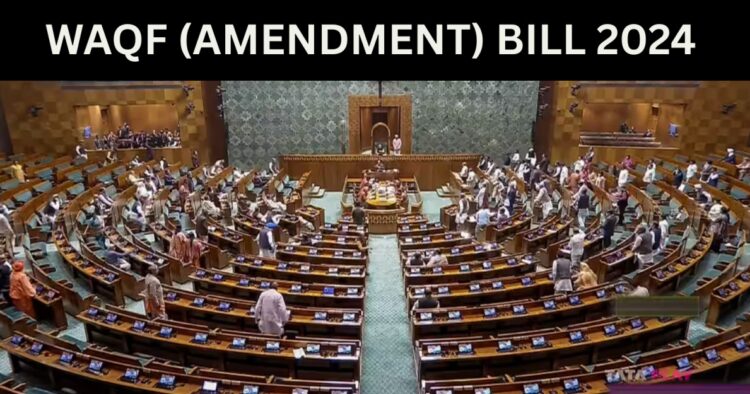- Waqf Bill 2024 includes non-Muslims for transparency.
- INDI Alliance opposes, citing religious bias.
- BJP pushes reform to stop corruption.
The Waqf (Amendment) Bill, 2024, is set to be introduced in the Lok Sabha today, but the opposition, led by the INDI Alliance, is already gearing up to oppose it fiercely. The bill aims to bring much-needed reforms in the management of waqf properties, ensuring transparency and accountability. However, opposition parties are trying to mislead the public by claiming that it is an attack on Muslims, despite the fact that the amendments will actually strengthen the system.
What is the Waqf Bill and Why is it Needed?
Waqf refers to the donation of properties, mainly by Muslims, for religious and charitable purposes. These properties are managed by waqf boards at the state and central levels. Unfortunately, many of these properties are registered without proper documentation, leading to corruption, illegal encroachments, and mismanagement. The bill seeks to address these issues by modernizing the registration process, using technology for record-keeping, and ensuring greater transparency.
Despite these crucial reforms, the INDI Alliance is opposing the bill, proving once again that their interest lies in appeasement politics rather than genuine welfare.
Inclusion of Non-Muslims: A Necessary Change
One of the most debated provisions of the bill is the inclusion of non-Muslims in the Central Waqf Council and state waqf boards. This amendment is crucial for several reasons:
- Transparency and Accountability: By including non-Muslims, the government aims to ensure that waqf boards function in a fair and transparent manner. For decades, these boards have been accused of corruption, with funds being misused and properties being encroached upon. A diverse composition will bring a neutral perspective and eliminate favoritism.
- Preventing Monopoly: Currently, waqf boards are controlled exclusively by Muslim members, leading to allegations of internal favoritism and financial irregularities. The presence of non-Muslim members will help prevent any monopoly and ensure decisions are made in the public interest.
- Upholding Secularism: India is a secular country where all religions are treated equally. If non-Hindus can be part of temple management boards in states like Tamil Nadu and Kerala, then why should Waqf boards remain exclusive to Muslims? The INDI Alliance, which claims to champion secularism, is showing its double standards by opposing this inclusion.
- National Interest Above Religious Politics: Waqf properties are not just religious assets but national assets. Their proper management should be a matter of national concern, not just a religious issue. The inclusion of non-Muslims will ensure that these properties are used for their intended purpose and not for political gains.
Opposition’s Misleading Narrative
The INDI Alliance, instead of supporting a bill that benefits the nation, is misleading the public by claiming that this is an attack on Muslim rights. The truth is, many state waqf boards have been accused of illegal land grabs, fraud, and favoritism. Instead of fixing these issues, the opposition wants to maintain the status quo for vote-bank politics.
Another major issue raised by the opposition is the allocation of time for debate. The Lok Sabha’s Business Advisory Committee has allotted eight hours for discussion, which is more than enough. The opposition, however, is demanding twelve hours, clearly aiming to delay and disrupt the legislative process instead of having a constructive debate.
Key Provisions of the Bill
Apart from the inclusion of non-Muslims, the bill proposes several other important changes:
- Giving state governments the authority to resolve waqf property disputes instead of district collectors, reducing bureaucratic delays.
- Reforming the Waqf Tribunal by including a district judge and a state government official to ensure balanced decision-making.
- Removing the controversial “waqf by user” clause, which previously allowed properties to be declared as waqf land simply because they were being used for religious purposes for an extended period, even without documentation.
The BJP-led central government has always prioritized national interest over appeasement politics. By introducing this bill, the government is ensuring that waqf properties are used correctly and that corruption within waqf boards is eliminated. Despite strong opposition, the BJP is confident that the bill will be passed, given its strong majority in Parliament.
The INDI Alliance’s opposition to the Waqf (Amendment) Bill, 2024, is yet another example of how they put political interests above national welfare. The inclusion of non-Muslims in waqf boards is a progressive and much-needed reform that will ensure transparency and accountability. If the opposition truly cared about the welfare of waqf properties, they would support this bill instead of spreading false narratives.
This bill is not about religion; it is about good governance. The BJP-led central government is taking a step in the right direction by reforming the waqf system. The opposition, on the other hand, continues to prioritize vote-bank politics over national interest. The public must see through their hypocrisy and support reforms that are beneficial for the nation as a whole.















Comments